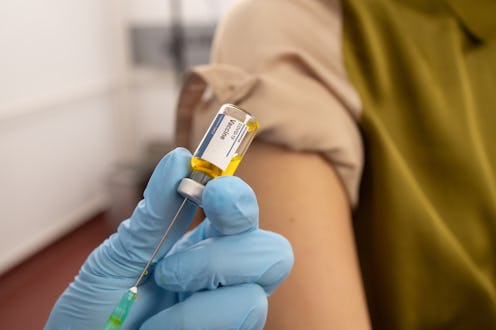Health
Will I Be A Moderna Gal Forever?
What’s (likely) going to happen when we need to re-up on immunity.

With three COVID vaccines currently available in the United States and millions eligible to get their jabs, summer 2021 is looking like a party — for the fully vaccinated, at least. Once everybody has their COVID shot this year, though, some experts are looking to the future, when you’ll need a new COVID vaccine dose, known as a booster, to deal with potential new strains of COVID and keep your immunity going strong. As you’re making your vaccine appointments now, experts say you aren’t necessarily “locked in” to Pfizer, Moderna, or J&J forever.
How Long Will COVID Vaccine Immunity Last? And When Will You Need A Booster?
Right now, it’s not known exactly how long your immunity from the COVID vaccine will last, but expect it be a solid chunk of time. “Don’t sell the current vaccines too short,” Dr. John A. Sellick, D.O., professor of medicine at the Jacobs School of Medicine and Biomedical Sciences at the University of Buffalo, tells Bustle. “This is unlikely to be like the measles vaccine, where you get solid, lifelong immunity, but it may not wind up being quite like influenza, where vaccine protection is relatively short-lived.” In other words, you likely will need another COVID shot in your lifetime, but it’s not known when that might happen.
A continuing trial of Moderna published in New England Journal of Medicine in April 2021 found that its antibodies persist for at least six months after the second dose, but declined a little in people over 56. Pfizer’s vaccine shows strong antibodies for at least six months, per continuing data from its Phase III trial, and Pfizer-BioNTech’s lead scientist told The Guardian in November 2020 he hoped it would last at least a year. Data also shows that Johnson & Johnson’s vaccine produces antibodies for at least 56 days, or a little less than two months.
We’ll know how long immunity from vaccines lasts when vaccinated people begin to show reduced antibody levels in tests, but only time will tell when that’ll be.
Are You Stuck With The Same COVID Vaccine Type For Booster Shots Forever?
“It is too early to tell whether we should vaccine-shop or stick with the same brand when the time comes [for a booster shot],” Sellick says. The recommendation with flu vaccines is that you try and get whichever one you can, and that might be the same for the next generation of COVID vaccines, too.
There are a lot of unknowns about what a future COVID vaccine may look like, and that will shape whether mixing and matching is a good idea. “Do we just need to boost preexisting immunity if this wanes quickly or, like influenza, does the vaccine need to be different to cover new variants that have emerged to escape previous immunity?” Dr. Diane E. Griffin, M.D., Ph.D., vice president of the National Academy of Sciences and distinguished professor of microbiology and immunology at Johns Hopkins Bloomberg School of Public Health, tells Bustle. Pfizer and Moderna are currently testing booster shots that do both: They top up immunity and protect against new variants in people after their current antibodies decline. The results on those shots should be in by the end of 2021, but they’re only being tested in those who had the Pfizer or Moderna shots previously.
“There is also great interest in ‘universal’ vaccines that would not require quite as frequent reformulation,” Sellick says. Universal vaccines would target all possible varieties of COVID and could last indefinitely. There are some in development, but right now they’re a long way from the market.
“Whatever the circumstances next year, there is no particular reason that [a booster] would need to be the same platform as the initial vaccine,” Griffin says. There is a difference between using vaccine boosters that are similar and those that radically differ from your original shot. Science reports that the Sputnik V and AstraZeneca vaccines, which use the same altered chimpanzee virus, could theoretically be paired well together as a primary vaccine and a later booster. But it’s not clear how people who’ve had vaccines that use mRNA, like Pfizer and Moderna, would react to a booster using a different mechanism — like Johnson & Johnson’s shot, which trains the immune system using a defanged cold virus.
Dr. Kylie Quinn, Ph.D., university vice-chancellor’s research fellow at RMIT University, wrote for The Conversation in March that mixing and matching future COVID vaccine boosters could actually be helpful for your immune system, stimulating it in multiple ways to deal with the same problem. That could make it stronger against COVID overall.
“Different might be better, or not,” Griffin explains. But there’s no data on how this might work in the real world as yet. “These questions will be answered in due time as we accrue experience with both the current vaccines and the virus over the next year,” Griffin says.
Experts:
Dr. Diane Griffin, M.D., Ph.D.
Dr. John A. Sellick, D.O.
Studies cited:
Doria-Rose, N., Suthar, M. S., Makowski, M., O'Connell, S., McDermott, A. B., Flach, B., Ledgerwood, J. E., Mascola, J. R., Graham, B. S., Lin, B. C., O'Dell, S., Schmidt, S. D., Widge, A. T., Edara, V. V., Anderson, E. J., Lai, L., Floyd, K., Rouphael, N. G., Zarnitsyna, V., Roberts, P. C., … mRNA-1273 Study Group (2021). Antibody Persistence through 6 Months after the Second Dose of mRNA-1273 Vaccine for Covid-19. The New England Journal of Medicine, 10.1056/NEJMc2103916. Advance online publication. https://doi.org/10.1056/NEJMc2103916